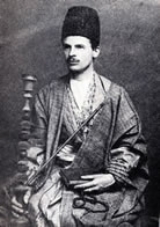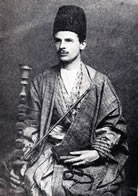
Edward Granville Browne
Encyclopedia

Stouts Hill
Stouts Hill is an 18th-Century Gothic revival country house situated in the Cotswolds, just outside the village of Uley. The house is currently a timeshare property....
, Uley
Uley
Uley is a village in the county of Gloucestershire, England. It is situated in a wooded valley in the Cotswold escarpment, on the road between Dursley and Stroud. The population is around 1,100, but was much greater during the early years of the industrial revolution, when the village was...
, Gloucestershire
Gloucestershire
Gloucestershire is a county in South West England. The county comprises part of the Cotswold Hills, part of the flat fertile valley of the River Severn, and the entire Forest of Dean....
, England, was a British
United Kingdom
The United Kingdom of Great Britain and Northern IrelandIn the United Kingdom and Dependencies, other languages have been officially recognised as legitimate autochthonous languages under the European Charter for Regional or Minority Languages...
orientalist
Oriental studies
Oriental studies is the academic field of study that embraces Near Eastern and Far Eastern societies and cultures, languages, peoples, history and archaeology; in recent years the subject has often been turned into the newer terms of Asian studies and Middle Eastern studies...
who published numerous articles and books of academic value, mainly in the areas of history
History
History is the discovery, collection, organization, and presentation of information about past events. History can also mean the period of time after writing was invented. Scholars who write about history are called historians...
and literature
Literature
Literature is the art of written works, and is not bound to published sources...
. His works are respected for their scholarship, uniqueness, and style.
The scholarly value of his works was acknowledged both during his lifetime and even more, after his passing. He gained a professorship at Cambridge University
University of Cambridge
The University of Cambridge is a public research university located in Cambridge, United Kingdom. It is the second-oldest university in both the United Kingdom and the English-speaking world , and the seventh-oldest globally...
. Much of his publications are related to Persia (now called Iran
Iran
Iran , officially the Islamic Republic of Iran , is a country in Southern and Western Asia. The name "Iran" has been in use natively since the Sassanian era and came into use internationally in 1935, before which the country was known to the Western world as Persia...
), either in the fields of history or Persian literature
Persian literature
Persian literature spans two-and-a-half millennia, though much of the pre-Islamic material has been lost. Its sources have been within historical Persia including present-day Iran as well as regions of Central Asia where the Persian language has historically been the national language...
. He is perhaps best known for his documentation and historical narratives of the Bábí movement as relayed by Count Gobineau
Arthur de Gobineau
Joseph Arthur Comte de Gobineau was a French aristocrat, novelist and man of letters who became famous for developing the theory of the Aryan master race in his book An Essay on the Inequality of the Human Races...
. He published two translations of Bábí histories, and wrote several of the few Western accounts of early Bábí
Babi
Babi may refer to:* Babı, a municipality in Azerbaijan* Babi Dynasty, founded in 1735 by Muhammed Sher Khan Babi , Nawabs of this dynasty went on to rule over Junagadh in Gujarat, from the 18th to the 20th century....
and Bahá'í
Bahá'í Faith
The Bahá'í Faith is a monotheistic religion founded by Bahá'u'lláh in 19th-century Persia, emphasizing the spiritual unity of all humankind. There are an estimated five to six million Bahá'ís around the world in more than 200 countries and territories....
history. His professorship at Cambridge was, however, of the Arabic language
Arabic language
Arabic is a name applied to the descendants of the Classical Arabic language of the 6th century AD, used most prominently in the Quran, the Islamic Holy Book...
, with the full title 'Sir Thomas Adams Professor of Arabic'.
He published in areas which few other Western scholars had explored to any sufficient degree. He used a language and style that showed high respect for everybody, even toward those he personally did not view in positive light.
In A Year Among the Persians (1893) he wrote a sympathetic portrayal of a Persian society which few Westerners had ever seen, including a frank account of the effects of opium. It did not attract the attention it deserved at the time of its initial publication, but after his death in 1926 it was reprinted and became a classic in English travel literature. He also published the first volume of A Literary History of Persia in 1902 with subsequent volumes in 1906, 1920, and 1924. At the close of the twentieth century it remains the standard authority on the subject.
Among Persians, at a time when nearly the whole nation was highly suspicious of foreigners, and in particular of any British or Russia
Russia
Russia or , officially known as both Russia and the Russian Federation , is a country in northern Eurasia. It is a federal semi-presidential republic, comprising 83 federal subjects...
n person due to the political dynamics of that time, Edward Browne was well accepted by the people who knew him and his works. He is well remembered today, and a street named after him in Tehran, as well as his statue, remained even after the Iranian revolution
Iranian Revolution
The Iranian Revolution refers to events involving the overthrow of Iran's monarchy under Shah Mohammad Reza Pahlavi and its replacement with an Islamic republic under Ayatollah Ruhollah Khomeini, the leader of the...
in 1979.
At the University of Cambridge
University of Cambridge
The University of Cambridge is a public research university located in Cambridge, United Kingdom. It is the second-oldest university in both the United Kingdom and the English-speaking world , and the seventh-oldest globally...
Browne was mainly responsible for the creation of a school of living oriental languages, in connection with the training of candidates for the Egyptian and Sudenese civil services, and the Lebanese consular service.
Edward Browne married in 1906. He had two sons.
It is important to mention that Browne was not a Bahá'í
Bahá'í Faith
The Bahá'í Faith is a monotheistic religion founded by Bahá'u'lláh in 19th-century Persia, emphasizing the spiritual unity of all humankind. There are an estimated five to six million Bahá'ís around the world in more than 200 countries and territories....
but rather an orientalist. His interest in the Bábí movement was piqued by a book he stumbled upon in a library in Cambridge by the French diplomat Comte de Gobineau whilst looking for materials on the Sufi movement. The history A Traveller's Narrative was written by `Abdu'l-Bahá
`Abdu'l-Bahá
‘Abdu’l-Bahá , born ‘Abbás Effendí, was the eldest son of Bahá'u'lláh, the founder of the Bahá'í Faith. In 1892, `Abdu'l-Bahá was appointed in his father's will to be his successor and head of the Bahá'í Faith. `Abdu'l-Bahá was born in Tehran to an aristocratic family of the realm...
and translated by Browne, who added a large introduction and appendixes. Browne was fascinated by the development of the written historical perspectives of the Bahá'ís regarding successorship after the Báb
Báb
Siyyid `Alí Muḥammad Shírází was the founder of Bábism, and one of three central figures of the Bahá'í Faith. He was a merchant from Shíráz, Persia, who at the age of twenty-four claimed to be the promised Qá'im . After his declaration he took the title of Báb meaning "Gate"...
including their idea of an independent dispensation of Bahá'u'lláh
Bahá'u'lláh
Bahá'u'lláh , born ' , was the founder of the Bahá'í Faith. He claimed to be the prophetic fulfilment of Bábism, a 19th-century outgrowth of Shí‘ism, but in a broader sense claimed to be a messenger from God referring to the fulfilment of the eschatological expectations of Islam, Christianity, and...
. These Bahá'í-authored works emphasized Bahá'u'lláh to a greater extent than the Báb and took a critical view against Mirza Yahya Subh-i-Azal, whom Gobineau listed as the Báb's successor. Browne expressed sympathy for Mirza Yahya and surprise at the route the religion had taken.
External links
Online texts- http://www.archive.org/search.php?query=mediatype%3A(texts)%20-contributor%3Agutenberg%20AND%20(subject%3A%22Browne%2C%20Edward%20Granville%2C%201862-1926%22%20OR%20subject%3A%22Browne%2C%20E%2E%20G%2E%20%28Edward%20Granville%29%2C%201862-1926%22%20OR%20subject%3A%22Browne%2C%20Edward%20G%2E%20%28Edward%20Granville%29%2C%201862-1926%22%20OR%20subject%3A%22Browne%2C%20Edward%20Granville%22%20OR%20subject%3A%22Browne%2C%20E%2E%20G%2E%20%28Edward%20Granville%29%22%20OR%20subject%3A%22Browne%2C%20Edward%20G%2E%20%28Edward%20Granville%29%22%20OR%20subject%3A%22Edward%20Granville%20Browne%22%20OR%20subject%3A%22Edward%20G%2E%20Browne%22%20OR%20subject%3A%22E%2E%20G%2E%20Browne%22%20OR%20creator%3A%22Browne%2C%20Edward%20Granville%2C%201862-1926%22%20OR%20creator%3A%22Browne%2C%20Edward%20Granville%2C%20Sir%2C%201862-1926%22%20OR%20creator%3A%22Browne%2C%20E%2E%20G%2E%20%28Edward%20Granville%29%2C%201862-1926%22%20OR%20creator%3A%22Browne%2C%20Edward%20G%2E%20%28Edward%20Granville%29%2C%201862-1926%22%20OR%20creator%3A%22Browne%2C%20Edward%20Granville%22%20OR%20creator%3A%22Browne%2C%20E%2E%20G%2E%20%28Edward%20Granville%29%22%20OR%20creator%3A%22Browne%2C%20Edward%20G%2E%20%28Edward%20Granville%29%22%20OR%20creator%3A%22Edward%20Granville%20Browne%22%20OR%20creator%3A%22Edward%20G%2E%20Browne%22%20OR%20creator%3A%22E%2E%20G%2E%20Browne%22%20OR%20title%3A%22Edward%20Granville%20Browne%22%20OR%20title%3A%22Edward%20G%2E%20Browne%22%20OR%20title%3A%22E%2E%20G%2E%20Browne%22%20OR%20description%3A%22Edward%20Granville%20Browne%22%20OR%20description%3A%22Edward%20G%2E%20Browne%22%20OR%20description%3A%22E%2E%20G%2E%20Browne%22%20OR%20description%3A%22Browne%2C%20Edward%20Granville%22%20OR%20description%3A%22Browne%2C%20E%2E%20G%2E%20%28Edward%20Granville%29%22%20OR%20description%3A%22Browne%2C%20Edward%20G%2E%20%28Edward%20Granville%29%22)Works by or about Edward Granville Browne] at Internet ArchiveInternet ArchiveThe Internet Archive is a non-profit digital library with the stated mission of "universal access to all knowledge". It offers permanent storage and access to collections of digitized materials, including websites, music, moving images, and nearly 3 million public domain books. The Internet Archive...
and Google Books (scanned books original editions color illustrated) - Babism, chapter from the book Religious Systems of the World, transcribed and proofread by Graham Sorenson, April 1999
- A Traveler's Narrative, transcribed and proofread by Alison Marshall
- A Year Amongst the Persians, transcribed and proofread by Duane K. Troxel

